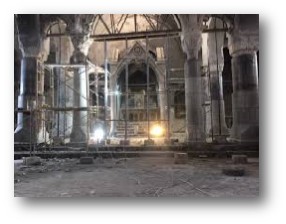Christians in Iraq caught between hope and fatigue
17 December 2019 | General Interest
How can I summarize the most important things from a recent 10-day visit to northern Iraq and Iraqi Kurdistan?
It was spent in the company of the Dominican sisters and Christians of Iraq, who experienced the horror of exile in 2014, life with refugees and have since rebuilt convents and schools, thanks to international solidarity.
Perhaps it is best to focus on just a few highlights.
In Karakoch, on the plain of Nineveh
I went to Karakoch (aka Bakhdida) about 15 times between 1993 and 2009. In 2019 I found a town healing its wounds.
Islamic State (IS) had gone to its oldest Syriac church, piled up its benches and books and lit a fire that burned everything, to the point of even damaging the marble of the pillars.
For months, the community has been working hard to clean and restore, but the bullet holes on the doors and the black soot walls are reminiscent of the violence that broke out there. Yet a group of men are in the stalls praying the Rosary in the middle of the afternoon.
About half the Christians returned, encouraged by the priests and sisters who rebuilt kindergartens and schools, so that children turn up in their hundreds. It reflects the power of life and faith of these Christian communities, which date back to the first centuries of Christianity.
But in other towns and villages like Batnaya, 90 percent destroyed by IS and then by the bombardments, very few choose to return.
Hijra, the escape
Once the usual greetings have been made — we are in the East — the sisters ask if I can imagine the violence of what they and everyone else had had to face.
The word hijra is on everyone's lips because the horror of that night from Aug. 5 to 6, 2014, when the Kurdish Peshmerga (military) stopped protecting the villages of the Nineveh plain in order to save at least Erbil, their capital, remains so vivid. In just half an hour, young and old had to pile into their cars, carrying only identity documents. In the heat of August, people crammed into cars that were reduced to a crawl, bumper to bumper.
Then came life in a camp for weeks, on mattresses flung on the ground, with the anxiety of not knowing where family and friends were.
"It was the feast of the Transfiguration," one sister told me. She confessed that she had asked God that just as in the three tents that the apostles wanted to build on Mount Tabor, there would be one for Jesus, so that he could be with them in their trial.
He certainly was, because many held on and life went on.
Reconstruction
From October 2016, when villages were gradually liberated and as soon as the first inhabitants dared to return, it was necessary to rebuild houses, churches, kindergartens and schools.
Obviously, charitable organizations such as the Oriental Charity, Aid to the Church in Need and the Fraternity in Iraq were present.
Iraq, one of the most educated countries in the Middle East, has no shortage of engineers and architects, while Turkey's dynamic economy provided all the necessary building materials.
The result is impressive, even if many buildings are still prefabricated. Life has resumed, but a fatigue is still being felt. These people need a break.

Preparing for the future
One way Dominican nuns prepared for the future was to send about 10 young members of the community abroad to prepare for bachelor's and doctoral degrees. They are now back from the United States, France and Italy.
One of them showed me a series of books on Saint Thomas Aquinas that he had brought back in his luggage. Another, older, translator of the books of Pierre Claverie and Timothy Radcliffe, shared with me a translation in progress of Master Eckart. Translating Master Eckart while the ruins of senseless violence are still all around represents a beautiful faith in the future.
Communitarianism
Traveling through the villages of the Nineveh plain, we constantly passed checkpoints, sometimes Kurdish, sometimes Iraqi.
All the soldiers were heavily armed. We also crossed villages where the green and black flag of the Shiite militias, who drove IS out and are now demanding the right to settle, to have land and houses, is everywhere. The omnipresent portraits of Hussein and Ali also attest to a powerful display of identity.
Communitarianism is more present than ever and does not bode well for Iraq and the region. How dare we talk about reconciliation, about building bridges and not walls, to people who have suffered so much?
In Sulaymaniyah, further south, a branch of the monastery of Mar Moussa [founded in Syria by the late Jesuit Paolo Dall'Oglio], led by two monks who lived with him, puts the meeting with Muslims at the center of its mission. One of them is Father Jacques Mourad, kidnapped by IS in May 2015 and held for five months.
Concern
Everywhere, the ongoing insurgency in Baghdad, Basra and the Shia cities in the south of the country is worrying. The death toll exceeds 300 dead and the number of wounded 6,000. The government in Baghdad is trying to maintain its power at all costs, by force.Iraqis, who have barely recovered from so many tragedies, are dreaming of another future.
However, for decades the region has been torn by political, economic and religious conflict drawing in countries, powers from outside the region. Iraq's future also requires a change in international politics. International solidarity used to be there. Perhaps something else is now being asked of us.
Jean-Jacques Pérennès is a Dominican priest and the director of the École Biblique in Jerusalem.
Attribution: Jean-Jacques Pérennès, published on https://international.la-croix.com/ on November 14th, 2019 © Bayard Presse. Photo courtesy of Adrian Dominican Sisters www.adriandominicans.org/Home.aspx.